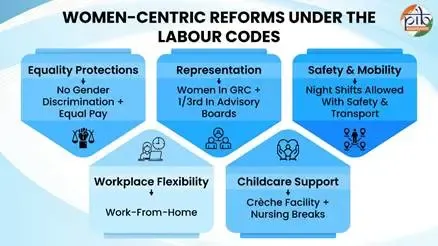Do New Labour Codes Enhance Maternity Support and Workplace Equality?

Synopsis
Key Takeaways
- Enhanced maternity leave of 26 weeks for eligible women.
- Equal pay for women during maternity leave.
- Workplace safety regulations to protect women.
- Support for women working in night shifts with proper safety measures.
- Representation of women in grievance redressal committees.
New Delhi, Nov 27 (NationPress) The government announced on Thursday that the newly implemented labour codes are designed to empower women through improved maternity support, equal pay, and workplace flexibility.
This month marked a significant transformation in India's labour regulation landscape with the introduction of four consolidated labour codes.
These codes comprise the Code on Wages, 2019, the Industrial Relations Code, 2020, the Code on Social Security, 2020, and the Occupational Safety, Health and Working Conditions Code, 2020.
The new framework modernizes labour laws and ensures women receive equal treatment, maternity benefits, workplace safety, and representation in decision-making roles.
In addition to protecting women workers' rights, these reforms widen opportunities by promoting equal opportunities and facilitating their involvement in all sectors, including night shifts and hazardous jobs.
“Women are an essential and growing part of India’s workforce. These new labour codes represent a major step toward establishing a more inclusive, safe, and empowering work environment for them,” stated the government in an official release.
The significant advantages provided to women are encompassed across all four labour codes.
The Industrial Relations Code 2020 requires adequate representation of women in the Grievance Redressal Committee (GRC), ensuring their representation matches their overall presence in the workforce. This provision guarantees that women workers can voice their opinions in workplace disputes, allowing for a more comprehensive and sensitive approach to addressing issues.
Under the Code on Social Security, every woman employee who has worked for at least 80 days in the 12 months leading up to her expected delivery is entitled to receive equal wages during a maternity leave period of 26 weeks.
Moreover, women who adopt a child under 3 months of age or are commissioning mothers (biological mothers utilizing surrogacy) are also eligible for 12 weeks of maternity benefits starting from the date of adoption or when the child is handed over.
Crucially, the law allows for work from home, provides nursing breaks for breastfeeding mothers, and mandates creche facilities.
Additionally, the legislation now permits women to work in all types of establishments and perform any job.
“With their consent, they may also work during the night, before 6 a.m. and after 7 p.m., provided the employer ensures sufficient safety measures, facilities, and transportation arrangements,” the statement asserted, aiming to enhance female participation in the workforce.
The Code on Wages, 2019, further insists that employers must not discriminate based on gender regarding recruitment, compensation, or employment conditions.
“Collectively, these initiatives bolster women’s economic empowerment and contribute to a more resilient, gender-balanced labour ecosystem,” the statement concluded.









